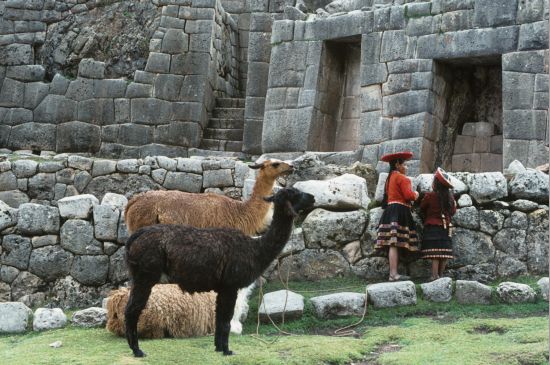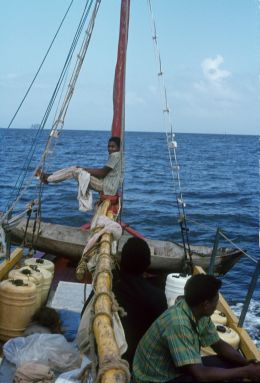| Barelds - Cycling around the world - Cycle stories - Asia, Africa, Europe, America | ||||||||||||||||||||
| home | site map | world | children | recent | cooking | dutch | german | react | ||||||||||||
South-America (7).

Peru: Girls with their lamas at the hot springs, already used by the Incas.
We cycled on brand new tyres, so fewer punctures, were it not that we had received a bad consignment again: Vredestein tubes, which tore immediately at the valve. We could not repair them and they were thrown into the desert; we continued on the old patched ones. Nasty feeling, in the middle of nowhere.!
The border with Ecuador was still sandy, a few cacti and a thorn bush, but within 20 km we were in the middle of tropical green, sweating in the hot humid air, between kilometres of long humid banana plantations, but no bananas for sale. At a village on stilts, we put up our tent. "Do you have some bananas for us ?" we asked a few children. They ran away and in no time there was a banana mountain in front of our tent. So: bananas with rice, bananas for dessert, bananas on our sandwiches, bananas in the porridge. In the morning we saw that even the cows eat bananas here.

Colombia: no road or path goes through the jungle to Panama and so we were dependent on a small boat in order to reach Central America.
One year and one day later we crossed the equator again, back again in the northern hemisphere. We were already back in the mountains, climbing and preferring the cool above the humid heat in the tropical low-land. With a quick descent we covered the final kilometres in Ecuador. On the bridge was the border with Colombia.
C
hecking in checking out, hey only the Colombians, where is the Ecuadorian immigration office? "8 kilometres back" said the Colombian, "up the mountain". We looked at the man. You sometimes have to pay for the check-in stamps of Ecuador, we heard. "How much does it cost for one stamp without going back to the Ecuadorian office?". "2 dollars", the custom officer said. "We are poor cyclists, otherwise we have to go up the mountain again, is 1 dollar also good?". Negotiating we did everywhere automatically. 1 Dollar disappeared into the drawer, and a stamp in our passports.In Pasto - the oil crisis raged across the whole world, we already knew that from the newspaper - they had run out of petrol. At the abandoned petrol stations, gangs stood ready in full dress. What a fortune that we moved on our own power. And also that we did not cook on petrol. However, at the the petroleum seller's we heard: "escasa", scarce. Regularly there was something "escasa" in South-America : margarine, bread, sugar. Mostly in the other city something else was scarce so that with some delay, we could always get the necessary things.
In the pouring rain we cycled on, all the time we had been looking out for some shelter. Behind a tobacco field was a shed on high poles under which tobacco hung out to dry. The tobacco farmer partly surprised, partly afraid, gave us permission to put up our tent under the shed. "Strangers never come here" he said . In the evening he stayed and talked the whole evening about their problems and was very interested about the Netherlands. Colombia in miniature: he an Indian, she a mulat (mestizo black) and the children a lovely hodgepodge of three peoples.
In Colombia there are only criminals" were the general stories we heard before we went there. "Robberies, assassinations are booming." And what did we find? Extremely friendly people, polite and obliging. Little boys who chased away the barking dogs; people who were proudly offering us their famous coffee, in short: a nice country.
Through thick tropical jungle we descended to the Caribbean Sea, leaving the Andes behind us. There we stood on the coast, the end of the road, just in Panama town, beginning again.
| Start World around | South-America | << Previous | Part 6 >> | |||
| Barelds on bicycle through the world - Cycling in Asia, Europe, Africa, America | ||||||